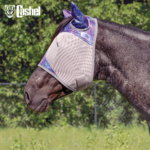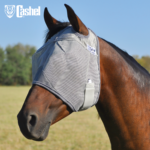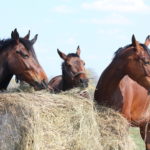April 6, 2011–?In 2010, we saw a rise in mosquito-borne diseases in areas across the county,” says Dr. Thomas Lenz. Protect your horses by getting their spring shots. Photo credit AVMA.

It is that time of year again when horses need to get their spring vaccinations. Any preventative health program should begin with core vaccines, such as those recommended for every horse in the United States by the American Association of Equine Practitioners. The organization?s guidelines state that eastern equine encephalitis, western equine encephalitis, West Nile, tetanus and rabies are considered core vaccines for horses. Horses in high risk groups, such as those competing and traveling may benefit from vaccinations against risk-based diseases caused by equine influenza virus and equine herpes viruses 1 and 4, which can cause serious respiratory disease.
?It’s very important that our horses are properly vaccinated by a veterinarian with the core vaccines, as well as any risk immunizations for their local area,? says Dr. Tom Lenz, senior director of equine veterinary services for Pfizer Animal Health. ?In 2010, we saw a rise in mosquito-borne diseases in areas across the county. Horse owners can help protect their horses now by getting their spring shots.?
Pfizer Animal Health offers a trusted line of vaccines, including West Nile Innovator to help protect against West Nile virus. In addition, the Mosquito Shot (a West Nile Innovator and EWT combination) helps protect against eastern equine encephalitis virus, western equine encephalitis virus and West Nile virus in a single vaccine. Fluvac Innovator EHV-4/1 helps protect against equine flu and rhinopneumonitis, the No. 1 cause of equine respiratory disease. These products and combinations are included in the ?Equine Immunization Support Guarantee.?
This program provides up to $5,000 for reasonable diagnostic and treatment costs if a horse properly vaccinated by a veterinarian contracts the corresponding equine disease. Disease protection backed by the Equine Immunization Support Guarantee includes infection from West Nile virus, equine influenza virus, tetanus, eastern equine encephalitis virus, western equine encephalitis virus and Venezuelan equine encephalitis virus. Vaccinations must be performed by a licensed veterinarian with an established client-patient relationship to be eligible.
?With the ISG program, horse owners can have trust in their vaccination program and confidence that the products are safe and effective,? Dr. Lenz says. ?Working with a veterinarian helps add assurance that the horse is being protected.?
Unvaccinated horses can be at serious risk of contracting disease, whether it is a mosquito-borne disease such as West Nile or eastern equine encephalitis, or an infectious disease such as influenza. Vaccinations through a veterinarian help offer the best protection in any preventative health care program.





